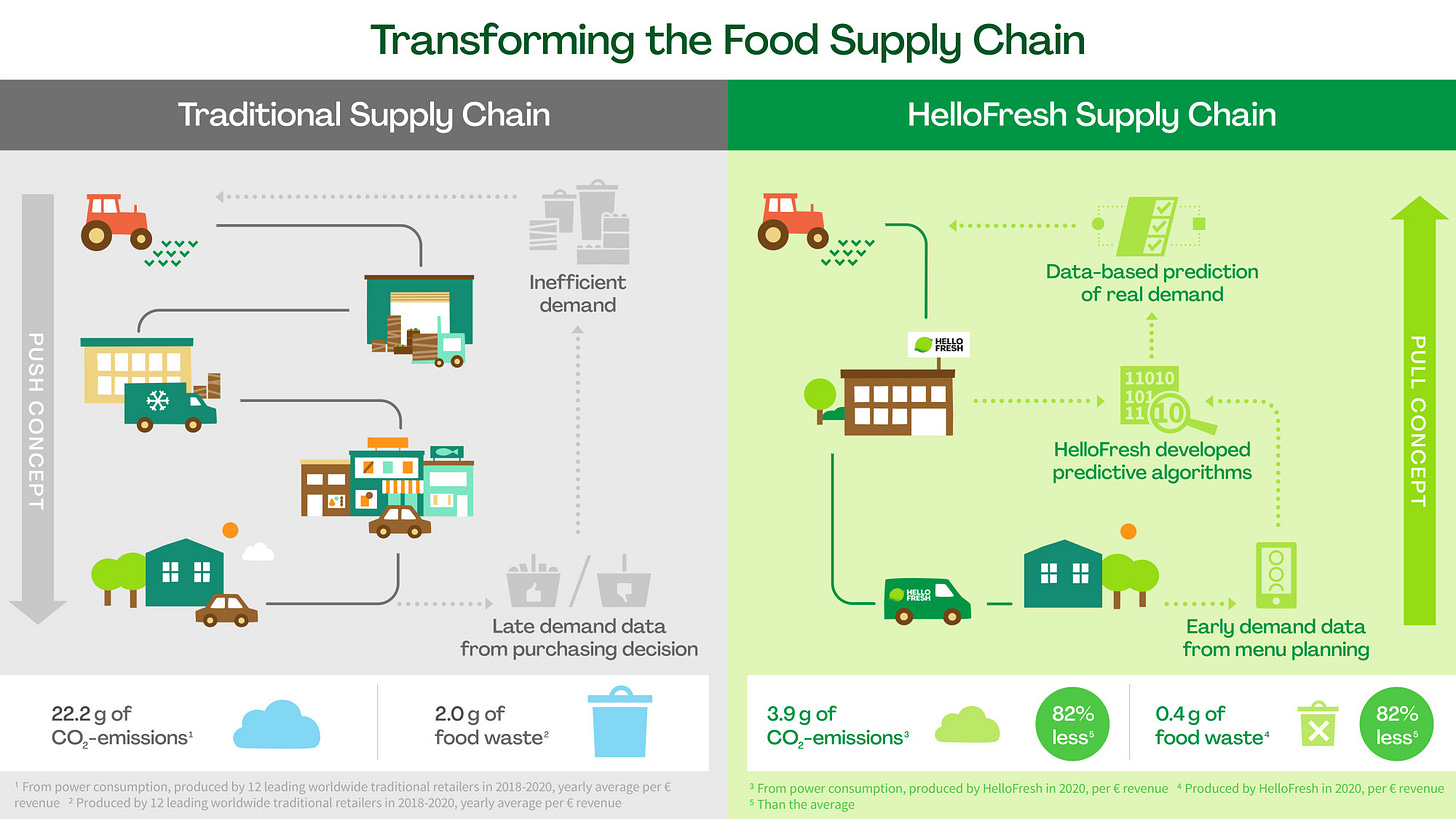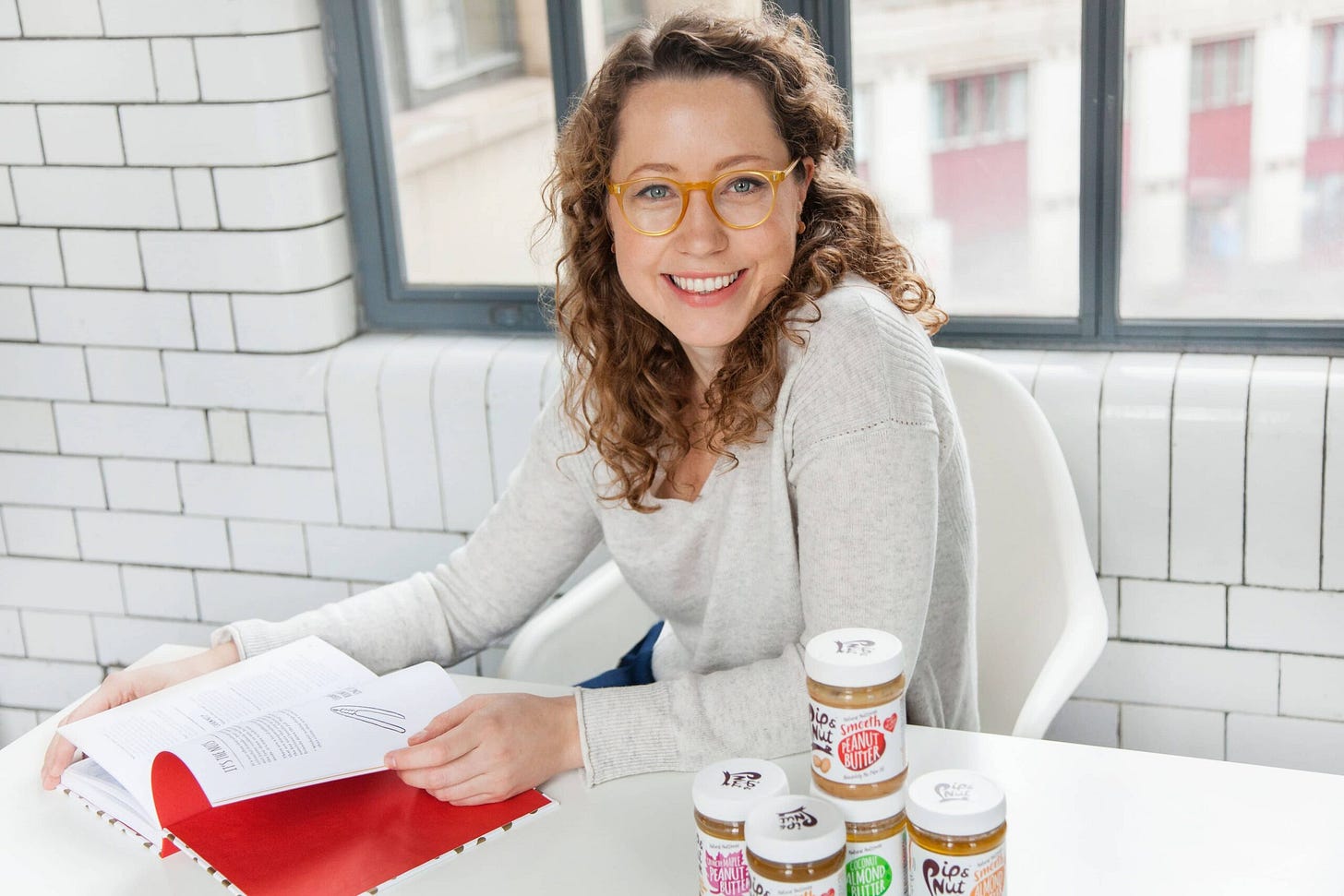🌱 HelloFresh: Taking 'no detours' on the route to supply chain efficiency.
Featuring HelloFresh, Re, Aduna Superfoods, Cathedral City and more...
Happy Monday!
This week we’re looking at shorter supply chains. We cover:
HelloFresh: Taking ‘no detours’ on the route to supply chain efficiency.
Loving local: Can SMEs lead the way with shorter supply chains?
In case you missed it: 💥 #7 - Meet the Brands: Pip & Nut are taking a crack at Net Zero, featuring Pip Murray, Founder and CEO of Pip & Nut.
> Good News Last Week
🎯 Re (from Beauty Kitchen UK Ltd) announced their partnership with Marks and Spencer, launching a trial of re-fillable own-brand cleaning and laundry products which are cheaper per gram than pre-packed counterparts.
🎯 Brevel raised $8.4 million in funding to scale their technology for micro-algae based alternative protein technology.
🎯 Brave Robot and Coolhaus have partnered to launch their range of ice cream sandwiches, made using Perfect Day animal-free milk protein that is also lactose-free.
⭐️ Cathedral City (Saputo Inc.) announced the redesign of their packaging with a plastic-saving side opening, which will see them save 40,000 tonnes of plastic per year.
⭐️ Co-op announced their partnership with Microsoft on digital platform Caboodle. The not-for-profit platform supported by Hubbub will connect supermarkets, cafes and restaurants with community groups, charities and volunteers to redistribute surplus food.
⭐️ Plant-based food producer Upfield announced plan to add carbon labels to 500 million products by 2050 after surpassing their 2021 target of 100 million products. Upfield has since formed The Plant-Based Food Alliance UK with Alpro, Oatly, ProVeg UK and The Vegan Society to drive engagement in the sector.
⭐️ Diageo announced their new solar energy farm on vacant land at its packaging site, in partnership with E.ON. and Emtec Group. 9000 panels will produce 4.1 megawatts of electricity, reduce CO2 emissions by around 830 tonnes per year and generate nearly a quarter of Diageo’s annual energy use.
⚡️ City to Sea campaign Refill launched a global campaign for World Refill Day on 16th June, with an open letter addressed to the top 5 world’s biggest plastic polluters - The Coca-Cola Company, PepsiCo, Nestlé, Unilever, Procter & Gamble. Sign it here.
⚡️Temasek announced the launch of GenZero, with US$3.6 billion committed to launch a new platform for decarbonisation solutions investment platform. GenZero will invest in companies developing solutions to address the emissions gap and get the world on track and limit the world’s temperature rise to 1.5 degrees.
⚡️ Virgin Money launched the Agri E Fund, with £200 million available for low-cost loans for farmers to invest in net-zero initiatives including net-zero and energy efficiency.
⚡️An industry-led consortium announced ‘The Flexible Plastic Fund FlexCollect’ pilot for flexible plastic household collection and recycling to offer local authorities financial support and operate kerbside collections. The £2.9 million will seek to understand how to incorporate flexibles into existing collections. Ecosurety, SUEZ recycling and recovery UK, RECOUP, and WRAP are managing the project as consortium members and co-funders.
> Click on each link to read more.
> Brand Spotlight
HelloFresh: Taking no detours on the route to supply chain efficiency.
The meal-kit delivery service was founded in Germany in 2011 with the mission of forever changing the way people eat. A mission that claims to put sustainability front and centre by offering ‘a sustainable evolution of the food system’.
HelloFresh operates its service through four core principles:
Budget: Helping consumers save money with every meal
Freshness: Democratising access to high-quality food
Taste: Allowing everyone to enjoy a varied and tasty diet
Sustainability: Less food waste and a CO2-neutral delivery of every box
Their sustainability principle keeps both people and the planet in mind, and aims for greater efficiency throughout. Let’s dig into four ways how…
The product is designed to lower waste as much as possible. Each recipe comes with the exact number of ingredients needed, resulting in 82% less food waste than a traditional food retailer. They’ve developed advanced algorithms that help them predict customer orders each week, and so help them plan their stock with greater accuracy - avoiding oversupply.
Any food that could go to waste, they donate. Reportedly less than 1% of all purchased ingredients do not make it to customers. Combatting food insecurity is now part of the company’s external mission, and in 2020 HelloFresh donated 5.5 million pounds of food, with this figure rising to 9.5 million pounds of food in 2021. The company has expanded this mission to interested customers by adding a “Meals With Meaning” option to donate a meal as a part of their subscription.
Energy efficiency is easier to achieve in a shorter supply chain. HelloFresh utilises renewable energy, resulting in 82% less CO2 per euro revenue when compared to traditional food retailers. Ingredients are shipped from supplier to production facilities, where they are then packaged to be sent to the customer. This saves on transport emissions (compared to traditional retailers), and no energy is needed to display goods. Additionally, in Australia and the Netherlands, they’ve switched to solar generation systems on their production facilities too. The result? According to a recent ISO-compliant LCA, HelloFresh meals create 25% less carbon emissions than the same meals made from supermarket ingredients. Pretty impressive!
They keep their distribution routes short too. Meal kits are shipped in batches on routes maximised for lower travel distances (their policy: no detours). In markets where they own their delivery fleet, they can reduce this even more and even bring in e-fleets.
A high quality, and short, supply chain is central to HelloFresh’s business model - and their suppliers are the cornerstone of this. The certified B Corp sources 96% of its produce from suppliers who are a part of the Global GAP/GFSI-certified; as well as 97% of its seafood from ASC, MSC, or BAP compliant suppliers. Sounds pretty diligent to us!
Interested? Read on…
Read HelloFresh’s 2021 Sustainability Report.
Check out what the Global GAP does.
Take a look at WWF’s report on the impact of food waste.
Support HelloFresh via their shop:
> Quick Take
Loving local: Can SMEs lead the way with shorter supply chains?
For years, businesses have sourced cheaper goods from all over the world. Now, after years of instability, the notion that a global supply chain is a more secure supply chain is undergoing a radical rethink. It’s no wonder booming brands like Hello Fresh are building their foundations on more localised supply chains, and thriving as a result.
According to Shopify’s Future of Commerce report, nearly half of brands are now investing in mitigating supply chain disruptions. The great news for small businesses is that there are huge opportunities that lie in keeping things local. Here’s why, and how, SMEs can jump on this opportunity.
What is a ‘short supply chain’?
A short supply chain, in the simplest terms, is one involving a limited number of economic operators. If you’re a food brand, a ‘long’ supply chain might be one where your ingredients sourced from multiple farms, transported to multiple depos before being processed in and distributed from multiple sites. The ‘short’ here refers simply to the number of links in the chain. It’s also about distance, however. A company with 3 different economic agents distributed across the globe shouldn’t be considered ‘shorter’ than one with 4 within a 5-mile radius.
What are the risks of a long supply chain?
Over the last few years, we’ve seen the risks of global supply chains come to the fore. The Institute for Government has mapped the myriad of factors creating the unprecedented levels of disruption we’ve seen over the last two years. Among them are; the pandemic, Brexit, surging energy costs, high shipping costs and the war in Ukraine. Climate change is arguably the biggest long-term risk to global supply chains. With increasingly disruptive and unpredictable weather affecting crops, water shortages affecting everything from food to clothing and physical damage from extreme weather, this is a risk that will only increase with time.
The benefits of a short one?
Shorter supply chains allow businesses to adjust supply much more responsively to demand. If you’re a UK-based company and your goods are mid-transit from across the world, then there’s no capability to respond to shocks with any immediacy. Making supply truly adapt to demand is essential to reducing waste. Along with the ever-important environmental benefits, this can dramatically reduce operating costs.
Localised supply chains are hugely marketable. Now more than ever, consumers want brands to support local suppliers, and to be rooted in their local community. We’ve covered before how smaller businesses can really harness this community spirit to build a unique brand identity - (check out our piece on The Cornish Drinks Company for inspiration). But this doesn’t mean that small consumer goods brands should feel restricted.
Let’s take an example: If you’ve got ambitions to be a global brand, look no further than Aduna Superfoods, who combine a worldwide reach with a limited supply chain. Ingredients are sourced from small-scale producers, then processed nearby by local groups of women. With this franchise-type model, products are distributed globally, but their creation (and the economic benefits) are kept within communities. Having turned over £100k in their first year, they’ve continued to thrive despite the volatility of the global market.
Interested in relocalisation?
Supply chain logistics are never easy. However, there’s a host of resources to help brands work with short supply chains:
Consider utilising tech to help you forecast customer demand more precisely. Eazystock is one example, but it’s well worth doing the research to find the right software for your business.
Gain real-time transparency through track-and-trace technology to really keep on top of delivery times and costs. As HelloFresh illustrate, optimising the physical transport of goods can have a huge environmental and financial impact.
Keep on top of new apps specifically designed for localisation. More and more European start-ups, like ‘social-network for supply chains’ Transparency One and Hier, connecting local food suppliers to retailers, are starting to emerge. This is a rapidly developing arena, so watch this space.
Go step-by-step and communicate with your customers, as advised by this relocalising business-owner.
> In case you missed it
💥 #7 - Meet the Brands: Pip & Nut are taking a crack at Net Zero
Featuring Pip Murray, Founder and CEO of Pip & Nut.
> Follow up with…
Article: Starting at the Source: Sustainability in Supply Chains
Podcast: Can Food Save The Planet? An Abel & Cole case study





